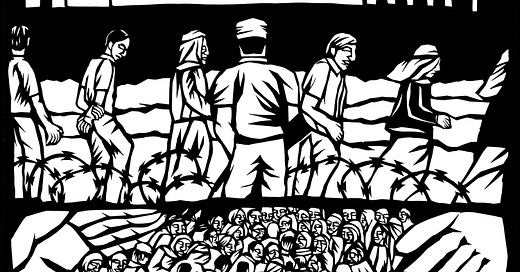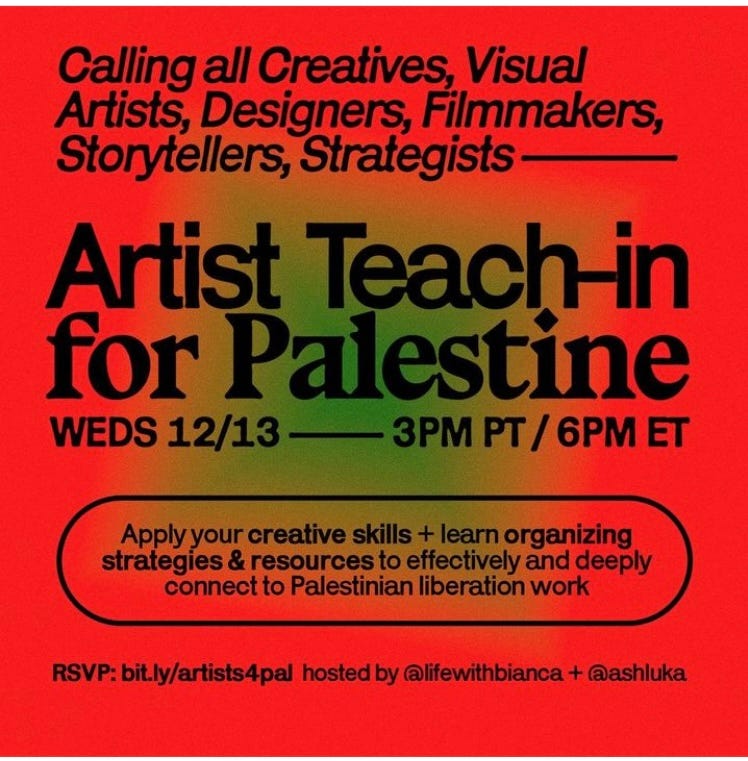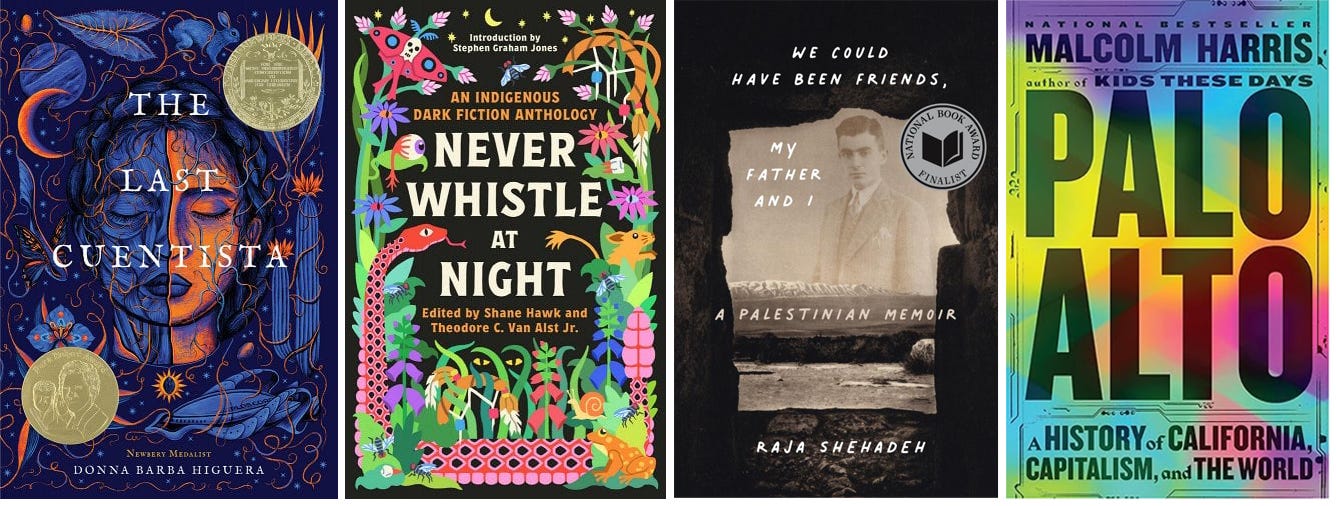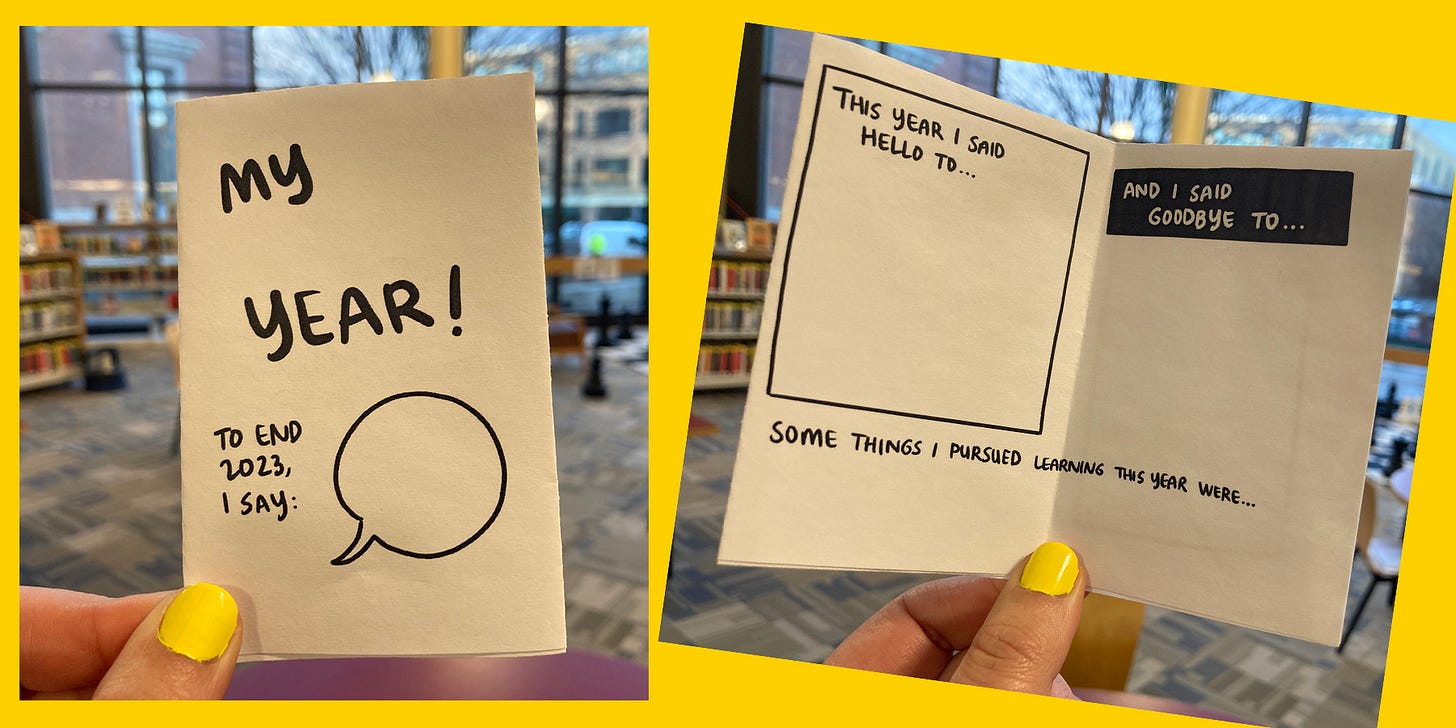… Resistance and change often begin in art, and very often in our art, the art of words.” — Ursula K. Le Guin

I didn’t think I would know anyone at the Vermont teach-in for Palestine, except for the one organizer friend who invited me. But when I showed up at the meeting hall in Barre, Vermont, a woman standing near one of the doors called my name and waved. She was a farmhouse neighbor who I’d gone kayaking with at the end of summer, when the days were long and warm. Now her breath steamed in the icy air and her face looked serious.
“Are you part of the workshop today?” I asked.
“I’m edge support,” she said.
“Oh, cool…” I said with uncertainty. “What does that mean?”
“Security.”
My stomach dropped. Right. In my morning rush to get there—grabbing coffee, immediately spilling the coffee on my sketchbook, driving an hour through lightly falling snow—I had forgotten that this event might be dangerous. Who would attack a group of school teachers?
… … …
Days before, a man had shot three Palestinian students who were taking a walk in Burlington.
Now as Jewish Voices for Peace and the Education Justice Coalition gathered teachers to learn approaches for discussing Palestinian history and perspectives, they felt concerned enough to post security by every door. Of course. This is the world we live in. But it doesn’t have to be.
… … …
As part of the training, we read an essay by Palestinian writer Mohammed El Kurd called “The Right to Speak for Ourselves.” He writes: “In the mainstream Western mind, who is considered mournable? Who is humanized? And who gets the mic?” That line made me reflect on when I had first heard from someone who was Palestinian. As a kid, I was an avid history and politics nerd. I was probably the only sixth grader in my hometown who loved reading The New York Times and spent my weekends devouring historical fiction. But I can’t recall ever reading, hearing, or learning anything about Palestine. Israel, sure, maybe, a little bit. That was the Middle East, right? Things were “complicated” over there. That’s all I knew.
I was 22 before I remember hearing a Palestinian speak in their own words. And that only happened only because my life took a sharp surprise turn that burst my U.S. media-bubble. In 2008, I was making zines at a collective studio in Portland and started talking to the person at the photocopier next to me. Their name was Chris and they were a Michigan art student who had been deployed as a prison guard at Guantanamo Bay. That blew my mind. I launched into asking them a million questions and we quickly became friends. Then when a group of former Guantanamo prisoners invited Chris to come on a speaking tour with them in England, I begged to come along and document the trip on a website I quickly designed and named Guantanamo Voices.
On that trip, I cried almost every day. I felt like I was witnessing something impossible: a former prison guard and former prisoners becoming friends. These were two groups of people who had been dehumanized and kept apart by razor wire. Yet by talking, they were able to build trust and find a common humanity. They could joke about the absurdity of pointless prison rules and compare notes on the lies the government had told each group about each other. This recognition of shared humanity was possible because Chris was able to critically challenge the propaganda that had been drilled into them. They were able to step back and see the people behind bars as people rather than alleged “terrorists.” They were able to question the racist and Islamophobic assumptions that U.S. culture is steeped in. They were able to take accountability for their own role in creating harm. And it was possible because the former prisoners took a leap of faith to trust Chris, deciding to reach out after seeing a YouTube video of Chris speaking at a protest against Guantanamo.
This trip happened in January 2009, during the Gaza War. Everyone around us each day was talking about the IDF, Hamas, intifada. I didn’t know what any of those words meant. But I wrote them down in my notebook. And, one day, I tagged along to a protest. The streets of Birmingham were full of people waving flags and signs in support of Palestine. As the huge crowd gathered in a square, I heard Palestinians speaking about their lives. What struck me more than anything was that these were real people, with real families and dreams and desires. How had I never heard their perspectives before? Why was the violent inequality in their homeland something that the entire world seemed to know about except for me, an American?
That might not have actually been the first time that I’d heard Palestinian voices. But it was certainly the first time I started listening.
A Few Resources for Listening and Discussion
Artists Teach-in for Palestine - This Wednesday, a group of artists have put together an online workshop for artists looking to connect with Palestine liberation work. Sign up for the free event here.
TeachPalestine.org - This well-researched website is home to many graphics, lesson plans, articles, and resources that are free for any teacher to use.
JustSeeds’ Free Art for Palestine - If you’re looking for posters, protest signs, or digital graphics to show support for Palestine, JustSeeds has a beautiful collection from artists around the world. These are creative commons images, so you can reproduce them as long as you don’t sell them. Erik Ruin’s print at the top of the newsletter is part of this collection, too.
Poems from Palestine - I was looking for poetry from Palestinian authors to share with my zine-of-the-month club and came across this beautiful collection that Baffler magazine put together in 2021. Sharing poetry is one way to honor Refaat Alareer, the beloved poet who the Israeli military killed this week.
Censured: A zine of Rashida Tlaib quotes - Rashida Tlaib, the Palestinian-American person in Congress, was censured for speaking up about the ongoing genocide. I juxtaposed her quotes with the text of the official censure notice, so you can compare the two. Since I’ve made this zine available, over 60 people have downloaded and distributed it. Feel free to print it out from here.
Upcoming Events
Classes: I still have spots left in my spring memoir comics class, an eight-week online class that starts up in February. Sign up here!
Zine of the Month Club: Next year, I want to focus on expanding the zine of the month club I run into being a genuine small press for comics. With that in mind, I’m recruiting more members. I’ve made it possible to sign up or to gift a zine club subscription without having to use Patreon. You can sign up for a year of zines or a six-month subscription.
Life Update
I’m drawing more than I ever have in my life. Literally for hours every day. This is because I’m in the midst of thumbnailing the big book I’m working on with my friend Eleri Harris about creating nonfiction comics. The book will come out in 2025, but the thumbnail version is due to our editor at the end of this month. Halp!
Stuff I Love
Isabella Rotman’s tarot deck - Did I tell you guys that I’ve been getting into reading tarot? I never really understood the appeal of tarot until I bought my friend Isabella Rotman’s very queer deck and read her insightful guidebook. Her 10 of Wands, which strikes too close to home, is seen in the photo above. I’ve been doing tarot readings with her deck over the past few months as a way to have conversations with new friends that give us a way to learn about each other.
SOUP! Because soup brings people together, my friend Maia and I have been organizing a weekly soup night for the students here at the Center for Cartoon Studies. I’ve linked several of my favorite soup recipes in the newsletter before (I can’t stop talking about soup…) so here’s a delicious one from Maia that was my favorite soup of the season: African peanut soup.
Invert newspaper - I met Olivia DelGandio when they were in my Art and Social Practice writing class last spring and now they’re launching a cool project: Invert, a queer newspaper. The first issue of this print newspaper launches this month, so check it out and consider subscribing here.
Paper Rocket’s Mini-Memoir Series - I just found out about this really nice series of mini-comics that each feature one bite-size memoir comic. I think this is a cool way to run a small press, with each comic telling a story by a different artist.
Surviving winter in Vermont - Here is my cold weather strategy. First, I put a Hot Hands in a neck gaiter. I pair that with a thick vest. Then I head to Fox Market and eat a handpie. After the sun sets at 3pm, I slip into my fursuit, long underwear, and Birkenstock slippers. I crawl into bed and, in between bites of soup, work on thumbnailing my book until I fall asleep.
A New Comic: “Roll for Luck”
I’ve spent the last few weeks at the Center for Cartoon Studies working on a memoir comic that captures the spacious and lonely feeling of being 12 years old in my hometown. It’s a sweet story about my brother creating a world for both of us.

What I’m Reading: Prose
Shoutout to Papercut Books in Jamaica Plain, where I went absolutely wild and bought so many books that they gave me a tote bag. Most of what I’m reading right now comes from their excellent staff recs.
The Last Cuentista - This novel by Donna Barba Higuera is **absolutely** my jam. As a meteor heads toward Earth, a Mexican-American girl escapes to a new planet with her scientist parents. But very bad news: their spaceship is taken over by fascists who want to erase all of Earth’s culture to make everyone the same in their new world. It explores some of the themes I was trying to get at in my graphic novel Open Earth, but does so much better, in my opinion!
Never Whistle at Night: An Indigenous Dark Fiction Anthology - I’m loving this collection that’s full of imaginative, haunting stories, many of which are rooted in Indigenous folklore. I only know two of the 25 or so authors, so it has given me a lot of Indigenous writers to follow, as well.
We Could Have Been Friends, My Father and I: A Palestinian Memoir - I wanted to know more about the recent history of Palestine, so I picked up this memoir from one of Palestine’s best-known writers and lawyers, Raja Shehadeh. It’s an intimate look at the legal fight against occupation, through the lens of a complex father-son relationship.
Palo Alto: A History of California, Capitalism, and the World - Because everything in Vermont is far apart, I’ve been driving more than I ever have in my life. That means I have plenty of time to listen to this 28-hour book about the history of California capitalism, which is giving me whole new perspectives on the California history I learned growing up.
What I’m Reading: Comics
Hidden Systems - Dan Nott has such an inspiring balance of precision and personality in his much-lauded book exploring the history of electricity, water, and the internet. I’m impressed with how clearly he can lay out extremely complicated ideas and how much heart shines through in a story about infrastructure.
Landings: A Crooked Creek Farm Year - One of the most moving comics I’ve ever read is Arwen Donahue’s story about raising (and killing) goats on her family farm in Kentucky. Her new book of ink-and-watercolor portraits of the daily life farm is beautiful and also captures the grinding, mundane reality of farm work.
Dear Mini - I assigned my memoir comics class to read an excerpt of Natalie Norris’s debut memoir processing sexual violence because I think her diary-like pages and honest writing are a style that every aspiring cartoonist can learn from. This book reminds me of opening up a private sketchbook and falling in.
Artificial: A Love Story - Amy Kurzweil came to speak about her new memoir at the Center for Cartoon Studies a few weeks ago and I was so impressed by her ability to weave together complicated, philosophical themes. This book explores her relationship with her father, who’s a technology-obsessed inventor, and his father, a pianist who fled the Nazis in Vienna.
Something to Do
Make a Zine Reflecting on Your Year
I’ve been getting into making these activity booklet style zines where I write in prompts for each page. I made one to help you all reflect on the past year—what you’ve learned, how you’ve grown, what you’ve welcomed, and what you’ve lost. Download and print the zine here. Please feel free to share yours with me once you fill it out, I would love to see it.









The year and reflection template is perfectly timed, it’s the last day of classes and I am bringing it in for my students to complete. (this is a first year composition class for college students, and there isn’t a lot of room for visual media, but we’ve made a couple zines this year using your one-page template and students have loved them.)
So many helpful resources here. Thank you!